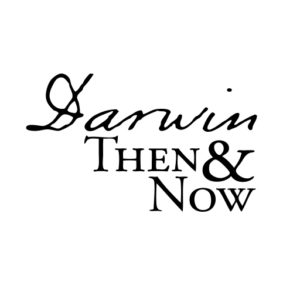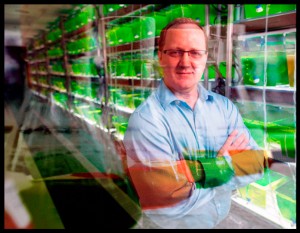 In The Origin of Species, Charles Darwin presented nature as a constant struggle, often coined as the “war of nature” or the “survival of the fittest.” As one dominates and eliminates others through a continuous process of competition and change, Darwin argued, “extinction and natural selection go hand in hand.” Recent freshwater studies, however, on algae defy Darwin.
In The Origin of Species, Charles Darwin presented nature as a constant struggle, often coined as the “war of nature” or the “survival of the fittest.” As one dominates and eliminates others through a continuous process of competition and change, Darwin argued, “extinction and natural selection go hand in hand.” Recent freshwater studies, however, on algae defy Darwin.
Bradley Cardinale (pictured left) of the University of Michigan led a research team that performed experiments on 60 species of freshwater green algae and their impact on environmental conservation. According to Marlene Cimons of the National Science Foundation, unexpectedly, the evidence “failed to support Darwin’s theory.”
Study Team
With a $2 million grant from the National Science Foundation, the study team searched for strategies in nature that preserve the environment. Cardinale explained to Cimons in the LiveScience article entitled “Doubting 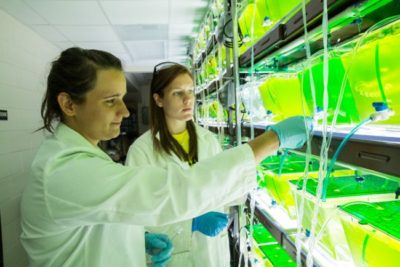 Darwin: Algae Findings Surprise Scientists” –
Darwin: Algae Findings Surprise Scientists” –
“Many biologists have argued that we should prioritize for conservation those species that are genetically unique, and focus less on those species that are genetically more similar.”
“The thinking is,” Cardinale continued, “that you might be able to tolerate the loss of species that are redundant. In other words, if you lost a redundant species, you might not see a change.” If true, the evidence would support Darwin’s theory.
Cardinale’s research team included Charles Delwiche, professor of cell biology and molecular genetics at the University of Maryland, and Todd Oakley, a professor in the department of ecology, evolution, and marine biology at the University of California, Santa Barbara.
Study Design
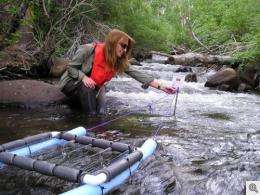 The team genetically sequenced 60 species of algae that are most common in the freshwaters of North America to establish their presumed evolutionary relationships.
The team genetically sequenced 60 species of algae that are most common in the freshwaters of North America to establish their presumed evolutionary relationships.
In the research, alleged redundant and distantly genetically related species competed against each other. The environmental impact associated with various types of competition models was estimated based on changes in algae biomass and rates of nitrogen uptake.
Study Results
Unexpectedly, independent of presumed evolutionary relationships, biodiversity alone had a higher preservation potential. Extinction, by any means, damages the environment. As Cardinale reported in the journal 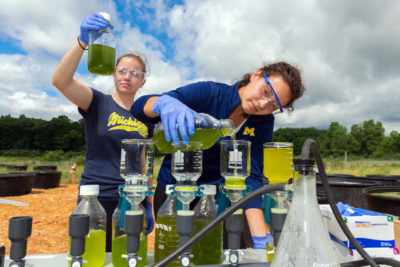 Nature –
Nature –
“As different forms of algae came to dominate each unique habitat in a stream, the more diverse communities achieved a higher biomass and greater 15N [nitrogen] uptake.”
Biodiverse collaboration, not competition and extinction, increases biomass and nitrogen uptake. Natural environments thrive on cooperation, not competition, as predicted by Darwin. Cardinale explained to Cimons –
“He [Darwin] assumed the whole world was composed of species competing with each other, but we found that one-third of the species of algae we studied actually like each other. They don’t grow as well unless you put them with another species. It may be that nature has a heck of a lot more mutualisms than we ever expected.”
Algae Defy Darwin
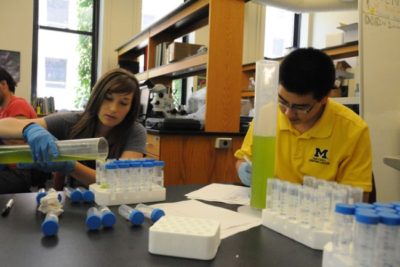 “We went into it assuming Darwin to be right and expecting to come up with some real numbers for conservationists,” Cardinale said. “When we started coming up with numbers that showed he wasn’t right, we were completely baffled.”
“We went into it assuming Darwin to be right and expecting to come up with some real numbers for conservationists,” Cardinale said. “When we started coming up with numbers that showed he wasn’t right, we were completely baffled.”
The team invested months in retesting to disprove their work. But the new tests yielded the same results. Cardinale explained his dilemma –
“The hypothesis is so intuitive that it was hard for us to give it up, but we are becoming more and more convinced that he wasn’t right about the organisms we’ve been studying,”
“If Darwin had been right, the older, more genetically unique species should have unique niches and should compete less strongly, while the ones closely related should be ecologically similar and compete much more strongly — but that’s not what happened,” said Cardinale.
“We didn’t see any evidence of that at all. We found this to be so in field experiments, lab experiments, and surveys in 1,200 lakes in North America, where evolution cannot tell us which species co-exist in lakes in nature.”
“If Darwin was right, we should’ve seen species that are genetically different and ecologically unique, doing unique things and not competing with other species,” Cardinale adds. “But we didn’t.”
Not only does algae defy Darwin, but the universe also defies Darwin.
“Evolution does not appear to predict which species have good traits and bad traits,” he told Cimons (pictured right). “We should be able to look at the Tree of Life, and evolution should make it clear who will win in the competition and who 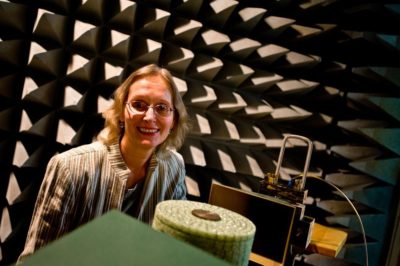 will lose. But the traits that regulate competition can’t be predicted from the Tree of Life.”
will lose. But the traits that regulate competition can’t be predicted from the Tree of Life.”
“It was completely unexpected,” Cardinale said in an interview with Cimons.
“We sat there, banging our heads against the wall. Darwin’s hypothesis has been with us for so long; how can it not be right?”
Cimons lamenting in the LiveScience article entitled “Doubting Darwin: Algae Findings Surprise Scientists,” said –
“Researchers were more than shaken to find that their experiments of freshwater algae failed to support Darwin’s theory,”
Genesis
Freshwater algae demonstrate why Darwin was once so wrong, then and now. Evolution was once a theory in crisis without evidence; it is now in crisis without even a logical argument.
 While the scientific evidence observed in freshwater algae is compatible with the Genesis account, Darwin’s theory is not consistent with either. As Nicholas Copernicus (1473-1543), a Renaissance mathematician and astronomer, explains during the Scientific Revolution –
While the scientific evidence observed in freshwater algae is compatible with the Genesis account, Darwin’s theory is not consistent with either. As Nicholas Copernicus (1473-1543), a Renaissance mathematician and astronomer, explains during the Scientific Revolution –
“To know the mighty works of God, to comprehend His wisdom and majesty and power; to appreciate, in degree, the wonderful workings of His laws, surely all this must be a pleasing and acceptable mode of worship to the Most High, to whom ignorance cannot be more grateful than knowledge.”
Evidence from molecular biology to validate the theory of evolution scientifically remains speculative.
Algae Defy Darwin is a Molecular Biology article.
Darwin Then and Now is an educational resource on the intersection of evolution and science, highlighting the ongoing challenges to the theory of evolution.
Move On
Explore how to understand twenty-first-century concepts of evolution further using the following links –
-
- The Understanding Evolution category showcases how varying historical study approaches to evolution have led to varying conclusions. Subcategories include –
- Studying Evolution explains how key evolution terms and concepts have changed since the 1958 publication of The Origin of Species.
- What is Science explains Charles Darwin’s approach to science and how modern science approaches can be applied to different investigative purposes.
- Evolution and Science feature study articles on how scientific evidence influences the current understanding of evolution.
- Theory and Consensus feature articles on the historical timelines of the theory and Natural Selection.
- The Biography of Charles Darwin category showcases relevant aspects of his life.
- The Glossary defines terms used in studying the theory of biological evolution.
- The Understanding Evolution category showcases how varying historical study approaches to evolution have led to varying conclusions. Subcategories include –

